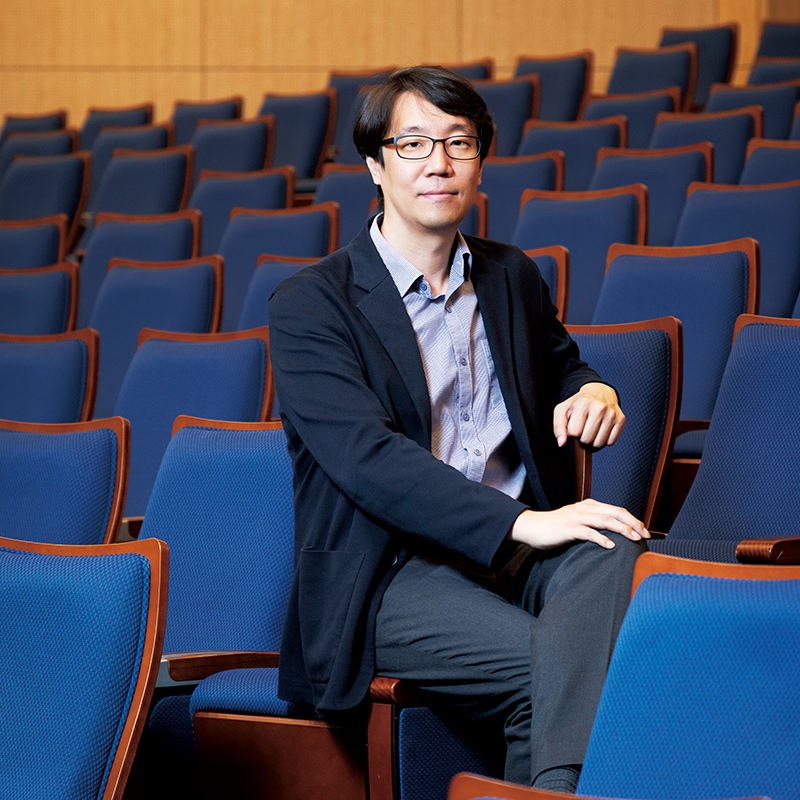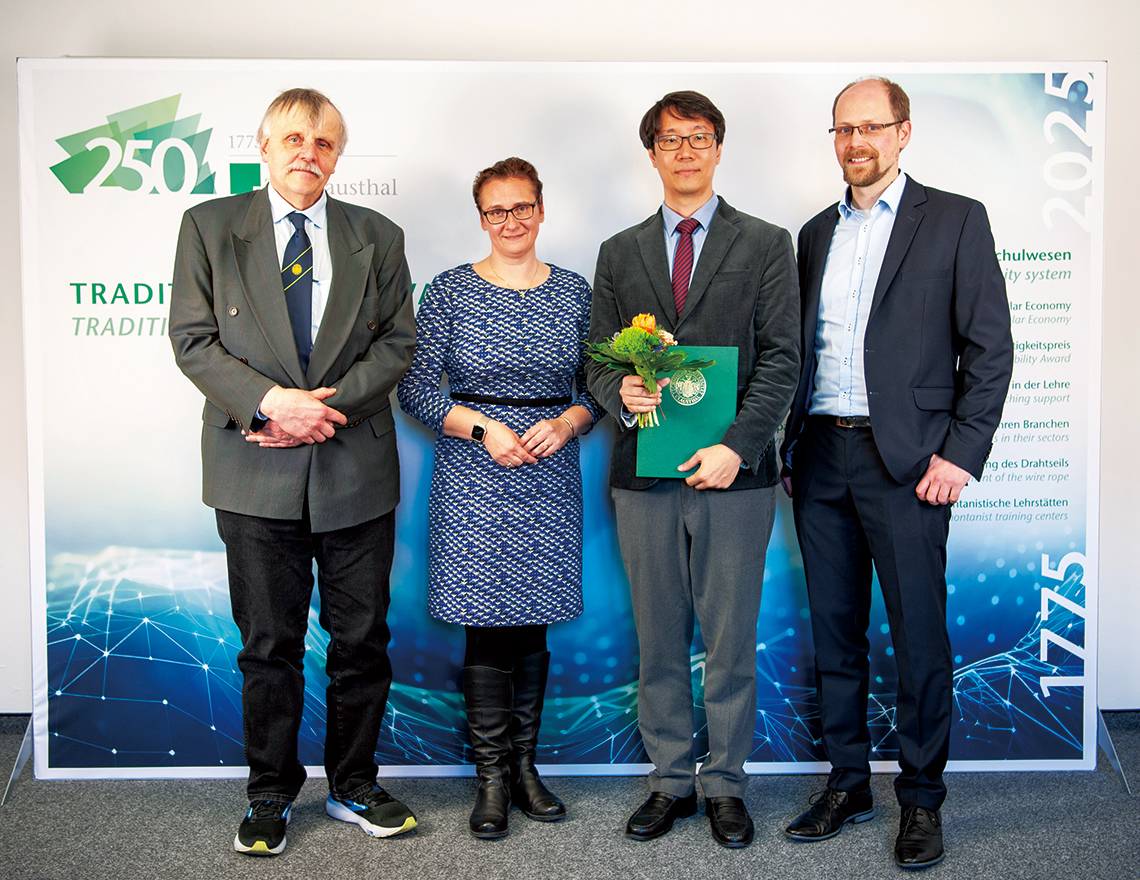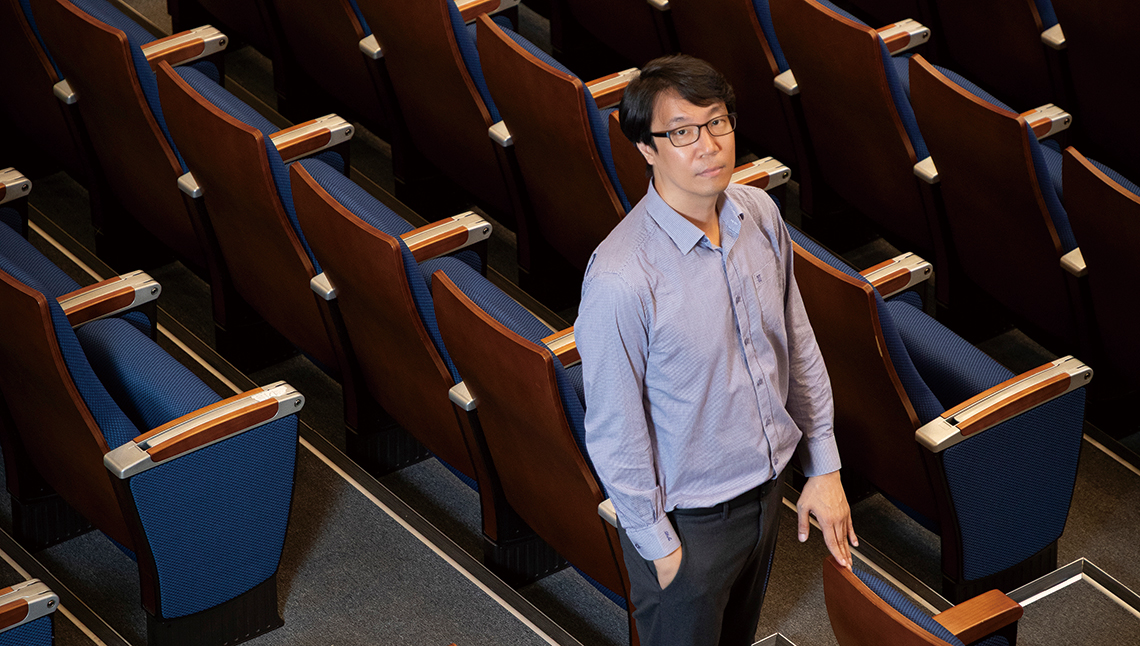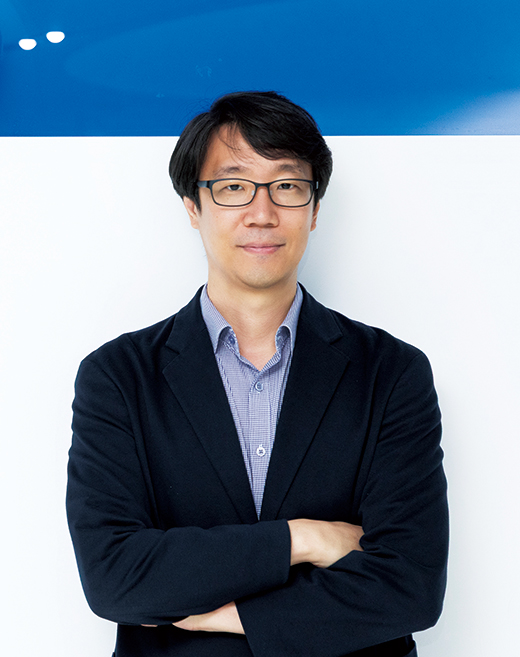Brain
A Third-Generation Korean Steel Researcher
Takes the Podium at a German University
Professor MinKyu Baek, Clausthal University of Technology
- Written by YeongIm Park
- Photos by HyeonGu Lee

Appointed as Full Professor at Clausthal University of Technology, Germany
Professor Baek recently returned from an academic conference on Jeju Island and is currently studying German despite his busy schedule. He will begin lecturing as a full professor at Clausthal University of Technology in Germany starting this October (the academic year at German universities typically begins in September or October). As most universities in Europe conduct undergraduate courses in their local language, his goal is to be able to teach in German within five years. In the first semester, he is scheduled to teach “Fundamentals of Thermodynamics”, “Computer Simulation of Thermodynamics”, and “Fundamentals of Metal Production Processes”.
Clausthal University of Technology has a 250 year history and specializes in engineering and natural sciences with particular focus on metallurgy and resource engineering. The manufacturing industry thrives in Germany, and although the university is modest in size, it is highly recognized for producing the most CEOs in the country. Similar to Hanyang ERICA, it emphasizes practical academic training. What makes Professor Baek’s appointment exceptional is that he is not joining as an associate or assistant professor, but as a full professor, a rank considered prestigious even among Germans. This kind of appointment is highly unusual for someone who earned his/her degree in Korea. Professor Baek explained that he was motivated to take on the challenge of working in Germany because the country, like Korea, has a manufacturing-based industrial structure, and thus there is active research conducted in metallurgy, which is the foundation of automobile and machine parts production.
Professor Baek explained: “At my interview, I made a strong impression by saying ‘In the 1960s and 70s, Korea’s first-generation steel professors studied at Clausthal University of Technology. Their students, the second generation, then went on to earn their degrees in the United States and Japan. As a third-generation steel researcher from Korea, it is an honor to return to Clausthal University of Technology.’ I heard that no Korean had ever been appointed a full professor in a science or engineering university since the 1990s, so I gladly accepted the offer. It still feels unreal but I am committed to making the most out of this honorable opportunity.”
 Professor MinKyu Baek was officially appointed in May as a full professor at Clausthal University of Technology.
Professor MinKyu Baek was officially appointed in May as a full professor at Clausthal University of Technology.
Diverse experiences from around the world become stepping stones
Professor Baek’s research field is chemical metallurgy, which in order to obtain desired properties during the metal manufacturing process, it is necessary to control the composition of molten metal and remove impure elements. To accomplish this, he researches technologies to understand delicate chemical reactions at high temperatures. While in graduate school, he mainly researched steel refining but after obtaining his Ph.D., he worked as a postdoctorate and industrial researcher overseas, expanding his research into non-ferrous metal smelting, including copper, light alloys, and battery materials. While working at Umicore, a Belgian battery materials company, he designed a process that reused byproducts from each stage as raw materials for other stages, achieving a waste-free production system. From 2022 to 2024, he worked as a senior researcher at the Research Institute of Industrial Science & Technology in Pohang, expanding his field further by researching eco-friendly metal production based on the design of processes to recover both metal byproducts and exhaust gases and waste heat. With the global shift away from traditional metals, his expertise in both ferrous and non-ferrous metallurgy received high evaluations in the appointment process at Clausthal University of Technology.
However, Professor Baek’s diverse background is not limited to his research fields. He has also lived in several different countries. After completing his Ph.D. at ERICA, he worked as a postdoc in Canada and Finland, later serving as an assistant professor at Umicore in Belgium and Aalto University in Finland. He has built an impressive career across borders on the global stage. He remarked:
“To take on a new field, I first encountered non-ferrous metallurgy while doing a postdoc in Canada. I believed battery materials would be promising in the future, so I gained more experience in Finland, where non-ferrous smelting was first developed, and then worked at a Belgian battery company. That naturally led to building my career across various countries.”
 Professor Baek has worked across borders at leading universities in North America and Europe, building his expertise in both ferrous and non-ferrous metallurgy.
Professor Baek has worked across borders at leading universities in North America and Europe, building his expertise in both ferrous and non-ferrous metallurgy.
You will eventually find your path
when you challenge yourself to accept new experiences
by crossing boundaries with a positive mindset.

Crossing Boundaries to See New Things
We met Professor Baek in an auditorium of the Conference Hall, where he had once served as emcee for the 30th-anniversary event of the Department of Materials Engineering. This happened when he was a graduate student and president of the department. Professor Baek expressed his delight as he recalled those memories:
“While studying at ERICA, I benefited from the excellent resources such as the Education-Research-Industry Cluster, Six Sigma education, engineering certification, and integrated master’s-doctoral track. Thanks to the BK21 scholarship, I was able to focus on research without financial worries. Learning from world-renowned professors in such a great environment and forming close bonds with peers remains an invaluable experience.”
Professor Baek has a strong ambition to not only teach and research at Clausthal University but also serve as a bridge between Korea and Germany, and even between Korea and Europe more broadly, promoting academic and technological exchanges. First, he hopes to establish a student exchange program between Clausthal University and ERICA so that students of the latter can gain overseas experience. Having served as president of the Society of Korean Scientists and Engineers in Finland and chair of the Korea-Finland Sustainable and Circular Economy Symposium, and currently as president of the Association of Korean Experts on Materials Scientist and Technology in Europe, he plans to participate in various international collaborative projects and conduct joint research with domestic academic and industry researchers to develop eco-friendly metal manufacturing processes. He continued:
“You can only discover new things by crossing the boundaries you’ve set for yourself. Whether that new thing suits you or not, you can only find out by trying. That’s the harsh truth of life. But if you keep challenging yourself to accept new experiences with a positive mindset, you’ll find your own direction before you even realize it.”
This is the message that Professor Baek, who does not fear challenges, would like to leave for his junior colleagues at ERICA before heading to Germany. We wish him well in the new challenges that await him after crossing yet another boundary.


Professor MinKyu Baek’s Major Education and Career Highlights
Education
- 2001-2008 Bachelor’s degree, Hanyang University ERICA
- 2008-2014 Ph.D., Hanyang University
(integrated master’s-doctoral track) - 2014-2017 Postdoctoral Researcher, McGill University, Canada
- 2017-2018 Postdoctoral Researcher, Seoul National University
- 2018-2021 Postdoctoral Researcher, Aalto University, Finland
- 2021-2022 Senior Researcher, Umicore, Belgium
- 2022-2024 Senior Researcher, Research Institute of Industrial Science & Technology in Pohang
- 2024-2025 Assistant Professor, Aalto University, Finland
- 2025-present Full Professor, Clausthal University of Technology, Germany
History
- 2020-2021 President of the Society of Korean Scientists and Engineers in Finland
- 2024-present President of the Association of Korean Experts on Materials Sciences and Technology in Europe
- 2021-2024 Chair of the Korea-Finland Sustainable and Circular Economy Symposium
Academic Achievements
- 2014 Outstanding Doctoral Dissertation Award, Hanyang University
- 2020 Commendation from the Minister of Foreign Affairs






